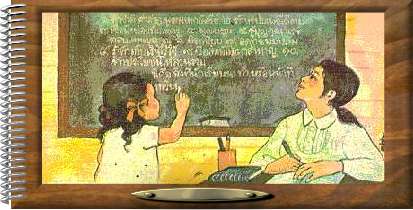
(Lesson 40: Part I)
| In this lesson the important
cultural notion of "group" is in play with the expressions "our
group"
พวกเรา and your
group
พวกเธอ.
Teacher Pailin reinforces Thai cultural values by reviewing the things that the children รู้จัก "know how to do" (to think and do), not simply รู้ "knowing facts and figures". Grammar-wise, we see the use of the superlative in "the most" มากที่สุด. The words สุดand สิ้น both carry the sense of termination, but the former ends something in a point in time (.e.g., the very last day of the month, the last child), while the latter applies to a slightly longer stretch of time (e.g., the final days or ending of the month or year). The former collocates with more words than the latter. |
|
You can also click on each underlined word to listen to its pronunciation. |
![]() ครูไพลิน
"นักเรียนเรียนหนังสือกับครูมาจนสิ้นปีแล้ว
ครูไพลิน
"นักเรียนเรียนหนังสือกับครูมาจนสิ้นปีแล้ว
ปีหน้าก็จะได้ขึ้นชั้นใหม่
![]() ครูดีใจที่นักเรียนเป็นคนดี ขยัน และตั้งใจเรียน
ครูดีใจที่นักเรียนเป็นคนดี ขยัน และตั้งใจเรียน
จนได้รับคำชมว่า
เป็นนักเรียนที่ดีมากของโรงเรียน"
![]() มานี "พวกเราจะได้ขึ้นชั้นใหม่ คุณครูไปสอนพวกเราไหมคะ
มานี "พวกเราจะได้ขึ้นชั้นใหม่ คุณครูไปสอนพวกเราไหมคะ
ฉันอยากให้คุณครูไปสอนพวกเราอีก"
![]() ครูไพลิน "ครูจะไปสอนพวกเธออีกค่ะ"
ครูไพลิน "ครูจะไปสอนพวกเธออีกค่ะ"
![]() นักเรียนทุกคนดีใจมาก ตบมือเสียงดัง
นักเรียนทุกคนดีใจมาก ตบมือเสียงดัง

![]() มานีพูดเบา ๆ กับชูใจ
มานีพูดเบา ๆ กับชูใจ
"ฉันดีใจมากที่สุด ที่ครูไพลินจะสอนพวกเราอีก
![]() ขึ้นชั้นใหม่เรานั่งเรียนหนังสือใกล้ ๆ กันอีกนะจ๊ะชูใจ"
ขึ้นชั้นใหม่เรานั่งเรียนหนังสือใกล้ ๆ กันอีกนะจ๊ะชูใจ"
![]() ชูใจยิ้มตอบรับ
ชูใจยิ้มตอบรับ
![]() ครูไพลิน "ครูใหญ่ชมนักเรียนทุกคนว่า เป็นเด็กดีมาก
ครูไพลิน "ครูใหญ่ชมนักเรียนทุกคนว่า เป็นเด็กดีมาก
โตขึ้นจะเป็นคนดีของชาติ
![]() ครูดีใจที่นักเรียนเป็นเด็กดี
ครูดีใจที่นักเรียนเป็นเด็กดี
เชื่อฟังครูและพ่อแม่ รู้จักคิด รู้จักทำ
![]() วันนี้นักเรียนลองมาช่วยกันคิดซิคะว่า
วันนี้นักเรียนลองมาช่วยกันคิดซิคะว่า
สิ่งที่นักเรียนน่าทำ หรือหน้าที่ของนักเรียนมีอะไรบ้าง"
![]()
| 23 | 24 | 25 | 26 | 27 | 28 | 29 | 30 | 31 | 32 | 33 | 34 | 35 | 36 | 37 | 38 | 39 | 40 |
| story40a | story 40b | structure40 | practice40 | vocabulary40 | Homepage |
author
& designer: Jenjit
August 2000